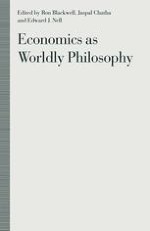1993 | OriginalPaper | Chapter
History, Human Nature and Justice in Marx
Author : Richard Castellana
Published in: Economics as Worldly Philosophy
Publisher: Palgrave Macmillan UK
Included in: Professional Book Archive
Activate our intelligent search to find suitable subject content or patents.
Select sections of text to find matching patents with Artificial Intelligence. powered by
Select sections of text to find additional relevant content using AI-assisted search. powered by
Understanding Marx is seldom an easy task, especially when one considers his views on justice. Although he never Wrote a treatise on justice, he Wrote enough about the topic to generate a lively controversy among Marx scholars.1 One apparently paradoxical aspect of his thought will be considered here; namely, its affinities to both the natural right and the relativist traditions of justice, traditions which have been in constant opposition to one another. The natural right tradition is based on the premise that principles of justice can be discovered through an examination of the natural attributes of human beings;of human nature in abstraction from the behaviour-shaping properties of historically given social, cultural, economic, and political institutions. In its most rigorous form it holds that there is only one true concept of justice and that it is valid for all times and places. The relativist, on the other hand, denies the possibility that a single, eternal concept of justice can be derived from knowledge of human nature as such. A concept of justice is valid if it is the posit of recognized authorities or if it reflects culturally specific values. A thoroughgoing relativist, therefore, believes it is impossible to find an objective, universal; transcultural, and transhistorical criterion by which to compare, evaluate or rank the normative validity of different concepts of justice.
